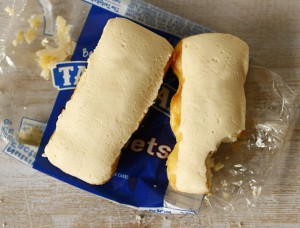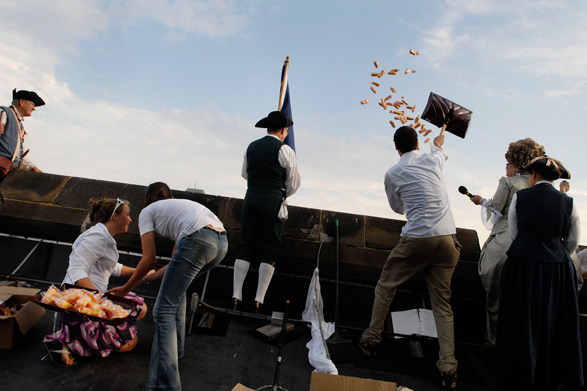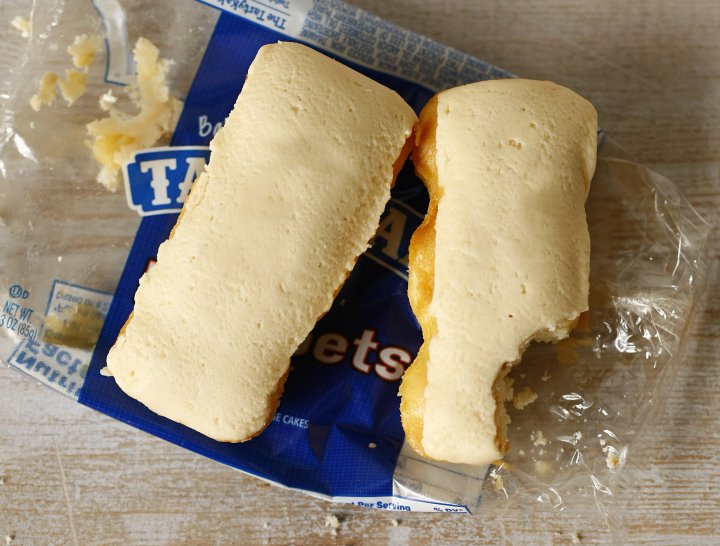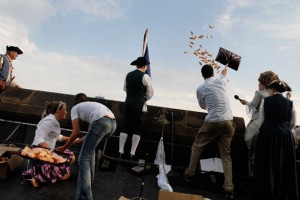Tastykake
By J.D. Bowers | Reader-Nominated Topic
Essay
“Nobody bakes a cake as tasty as a Tastykake” has been a brand tag line known by virtually every Philadelphian for a century. Indeed, few things are as iconically associated with the city and region as Tastykakes.
The company was founded in 1914 by Philip J. Baur and Herbert T. Morris, in the Germantown neighborhood along Sedgley Avenue, with an initial investment of $50,000 ($1.2 million in 2013 values). With the first cakes, which were full-sized loaf cakes with icing, priced between five and ten cents, the company sold close to three million items in its first nine months of operation. The city’s industrial class, made up of laborers in the factories, mills, and mines and their families, enjoyed the inexpensive baked goods as an added treat in their lunchboxes and on weekend picnics in the region’s parks. Over the next century, with only small changes to its equally iconic logo, the company’s products became a staple of packed lunches, snack time, and Phillies baseball games. No small numbers of friendly arguments have been started by the simple question: “What’s your favorite Tastykake?”

Locals, including the constant waves of immigrants, took to the treats so much that within eight years Tastykake outgrew its original site and moved to Hunting Park Avenue. There the bakery began to add new product lines, most notably the personal-sized treats for which they are known today, including the Chocolate and Coconut Juniors. In 1927 came the first Butterscotch Krimpet and soon thereafter a line of individually wrapped fruit and cream pies, all of which were bundled in wax-paper, a tradition that lasted into the 1960s. The Tandy-Kake introduced in 1931 became the Kandy Kake, the most popular cake in the company’s history, with nearly half a million baked and packaged each day.
Until 1941 the company distributed its products almost wholly by horse-drawn delivery wagons, making them an exclusive city treat. But World War II changed all that as the company sent thousands of cakes and pies overseas to soldiers in both the European and Pacific/Asian theaters, vastly expanding its market.
In the post-war boom, the company latched onto the growing popularity of television and professional sports, further broadening brand awareness. Stars such as Dick Clark, Shari Lewis and Lambchop, and Betty White all served as spokespersons. In a 1970s commercial, White promoted the company’s core business principle with the nostalgic slogan “All the good things wrapped up in one.” Throughout this period the baked goods were ever-present at Phillies baseball games and Flyers hockey games, and hall-of-fame broadcaster Harry Kalas peddled the treats to tens of thousands listening on radio.
The Tastykake brand identity expanded further and sales doubled in the late 1950s and early 1960s when the company installed state-of-the-art machinery that cut the baking cycle from twelve hours to forty-five minutes. Hand-wrapping, a practice since the company’s inception, came to an end. The company went public (NYSE: TBC) in 1961, further boosting sales, and went on to buy other food firms, including a cobbler company in Arkansas, a potato chip company in Pennsylvania, and the Ohio-based Buckeye Biscuit Company.
In the 1970s and ’80s Tastykake sought to respond to the changing demographics and aging population of the region. A flurry of new product development added muffins, chocolate-covered pretzels, and pastries. The company also began to expand its marketing with sports teams outside the city, including the Baltimore Orioles, Pittsburgh Steelers, and the New York Yankees.
These efforts expanded the reach of Tastykakes outside the region of Philadelphia, Delaware, southern New Jersey, and parts of central Pennsylvania. Soon snackers found Tastykakes in the New York City area, as far west as Ohio, and, in an effort to catch the market of the growing number of snowbird retirees, south into Florida. Further distribution contracts put the cakes onto shelves in forty-six states. But expansion and slow sales outside the Mid-Atlantic region also overextended the company, forcing it to refocus solely on the baking business. After a decade of unloading acquisitions, Tastykake expanded once again, in 1996, but this time strictly aligned with its core business model, by purchasing a bakery in Oxford, Chester County, to expand into the production of doughnuts, breads, and honey buns.
Tastykake also responded to an increasingly global marketplace. Despite being a predominantly regional product, the company obtained ingredients from around the world, including sugar cane and cocoa from Africa’s Ivory Coast, vanilla from Madagascar, cinnamon from Indonesia, nutmeg from the East and West Indies, and banana puree from Ecuador.
By the end of the first decade of the twenty-first century, however, globalization had caught up with Tastykake. In 2010 the company moved its headquarters and major center of operation from the Hunting Park Avenue site to the Philadelphia Naval Business Center (formerly the Philadelphia Naval Shipyard), where it helped to transform the military base into a modern-day business park. Taking advantage of existing buildings at the shipyard, Tastykake built a modern bakery that earned LEED Silver certification, a rating system for “green” buildings. But it was the company’s last significant, independent action.
Despite the significantly regional market share, based on brand loyalty and the highly regional tastes for specific products, in 2011 Tastykake was sold to Flowers Foods, of Thomasville, Georgia, for $34 million in cash. It was the end of an era. Under new ownership Tastykake celebrated its 100th anniversary (“Celebrating 100 Years of Freshness!”) in 2014 with an extensive campaign online and through social media. The treats once available only in Philadelphia and regional stores by this time were available up and down the East Coast, all across the South and Southwest, as well as online for shipping anywhere. Tastykake remained iconic in the Philadelphia region and among those who grew up with the products and moved away, but the company changed over the years to meet the challenges of a changing society.
J.D. Bowers is Associate Vice Provost for University Honors and Associate Professor of History at Northern Illinois University. A native of Pennsylvania, he still has Tastykakes regularly shipped to him. (Author information current at time of publication.)
Copyright 2015, Rutgers University


